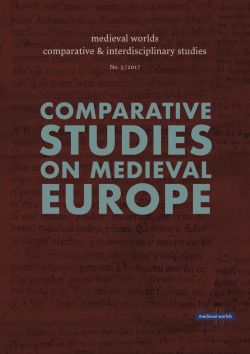 |
 |
Walter POHL – Andre GINGRICH (Eds.)
medieval worlds • no. 5 • 2017
medieval worlds 5 (2017)
Claire Weeda
S. 95 - 112 doi: 10.1553/medievalworlds_no5_2017s95
Verlag der Österreichischen Akademie der Wissenschaften
Abstract:
Examining synchronic and diachronic discourses of the body in relation to groups sheds light on concepts of ›ethnicity‹ from an emic perspective. From the tenth century, monks, first in Spain and later in North-Western Europe, began to compile lists of ethnic characteristics, summing up the virtues and vices of peoples. By the twelfth century, such enumerations of ethnic diversity featured in textbooks of rhetoric, collections of proverbs, and in poetry and prose. The ontology of ethnic characteristics likewise transformed from the religious-ethical to the medical. Early medieval monks catalogued the virtues and vices of groups loosely arranged according to an Evagrian or Gregorian ethical system of seven or eight cardinal sins and virtues, expounding the function of groups‹ moral dispositions, which were, in the eschatological history of salvation in both the past and the present, subject to free will. However, from the twelfth century, under the impact of Galenic humoral theory, students of the liberal arts began to attribute ethnic characteristics on biological grounds, referring in particular to the heredity influence of climate. In the same period, ethnic groups were now considered as entities dwelling in bounded territories that bore the stamp of their name, sometimes envisaged as a body politic. As such, the ethnotype, and its ruler, could stand as a pars pro toto for the ›nation‹.
Central Middle Ages; ethnic character; virtues and vices; eschatology; rhetoric; Galenic humours; body politic Published Online:
2017/06/30 14:10:16 Object Identifier:
0xc1aa5576 0x00369e4d
Rights:All rights reserved.For questions regarding copyright and copies please contact us by email.
MEDIEVAL WORLDS provides a new forum for interdisciplinary and transcultural studies of the Middle Ages. Specifically it encourages and links comparative research between different regions and fields and promotes methodological innovation in transdisciplinary studies. Focusing on the Middle Ages (c. 400-1500 CE, but can be extended whenever thematically fruitful or appropriate), MEDIEVAL WORLDS takes a global approach to studying history in a comparative setting.
MEDIEVAL WORLDS is open to regular submissions on comparative topics, but also offers the possibility to propose or advertise subjects that lend themselves to comparison. With a view to connecting people working on related topics in different academic environments, we publish calls for matching articles and for contributions on particular issues.
Table of Contents
Walter POHL, Editor’s Introduction
The Sudden Success of Prose –
a Comparative View of Greek, Latin, Old French and Old Norse
Lars Boje Mortensen
Could Isidore’s Chronicle Have Delighted Cicero? A Response
Richtard W. Burgess and Michael Kulikowski
Revisiting Pre-Modern Ethnicity and Nationhood: Preface
Ilya Afanasyev and Nicholas S. M. Matheou
»Becoming English«: Nationality, Terminology,
and Changing Sides in the Late Middle Ages
Andrea Ruddick
Reinventing Roman Ethnicity in High and Late Medieval Byzantium
Yannis Stouraitis
The Characteristics of Bodies and Ethnicity c. 900-1200
Claire Weeda
Rethinking Ethnicity and ›Otherness‹ in Early Anglo-Saxon England
James M. Harland
Church, Apostle and People in Early Ireland
Patrick Wadden
Digitising Patterns of Power (DPP):
Applying Digital Tools in the Analysis of Political and Social Transformations
in the Historical Region of Macedonia (12th–14th Centuries)
Mihailo St. Popović and Veronika Polloczek
The Bible in Historical Perception and Writing
of the Transcultural Iberian Societies, Eighth to Twelfth Centuries
Matthias Tischler und Patrick Marschner
The journal is funded by the Austrian Science Fund (FWF).

|





 Home
Home Print
Print
 References
References
 Share
Share
